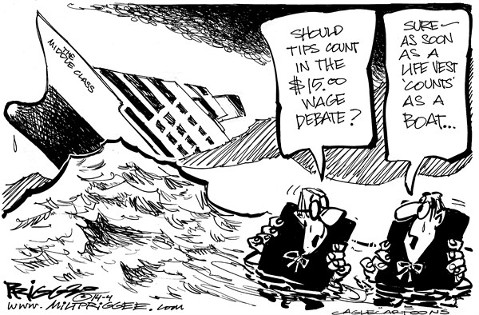It’s a Matter of Equity
Makers and Takers and the Minimum Wage

In the 2012 presidential campaign, Mitt Romney was caught on video making what he thought were private remarks wherein he stated 47 percent of the U.S. population did not pay federal income tax and were therefore living off government largesse. He called them “takers” and inferred they would never identify with his constituency. He even talked about them in other speeches as lazy and shiftless because they didn’t go out and make a living. On the other hand he referred to his constituency as the “makers” since they were the ones out their creating jobs.
Romney was probably correct in his assessment that 47 percent did not pay any federal income tax, but he dismissed too lightly the reasons. Clearly, some of those 47 percent were retired and living on fixed incomes of which Social Security was a big part. It should be noted that during the working years of Social Security recipients, their contributions to the Social Security Trust Fund were after taxes. Also, some of the 47 percent were working at jobs that never paid enough to reach the taxpaying threshold. These people could hardly be claimed to be living off the government. And there are some of the 47 percent that for many circumstances need government help.
So Romney was right about only one thing; a lot of people don’t pay federal income tax. But before we pass judgment, we need to explore why. How many who work don’t pay taxes simply because they don’t earn enough? How many are trying to make a living on something near the minimum wage?
We can observe that if many of these low-wage workers were paid more, some might be eligible to pay taxes. How high would that wage have to be to make a significant difference? Perhaps the question we should be asking is how high should the minimum wage be set to enable many of the 47 percent to join the legion of taxpayers?
On the “makers” side, what is their view? It is among the makers that we find the most resistance to increases in the minimum wage. Some go as far as to suggest that we should eliminate the minimum wage altogether. If the “makers” depend on making their profits from their ability to maintain low wages, who are the real takers? Walmart is the poster boy for this kind of tactic.
If the minimum wage were to be established at a higher level, the funds for this would come out of the private sector, not the federal government. Between higher minimum wages and more government assistance to the poor, which would necessarily come out of the federal budget, it is noteworthy that there seems to be more support among conservatives for the latter. If the same forces that are against bigger government want the government to provide more assistance, and are at the same time against higher minimum wages, isn’t this simply the self-interest of those who control the private economy?
Some claim that if we raise the minimum wage too high, some businesses will not be able to compete. If businesses are successful only because they can hire low-wage workers, do we really want to encourage that as part of a successful economic model? Do we want the government to be the enabler of businesses that can only survive if wages are held down? Are these the real “takers?”
Before we consider if higher minimum wages force out successful businesses, we must examine what benefits might derive from higher minimum wages that reach the point where more workers would now pay income taxes. First, there would be an increase in flows to the federal treasury. Second, there would be a similar increase to the Social Security Trust Fund, perhaps to the degree that its long-term solvency is no longer an issue. (It should be noted here that Romney’s contribution to the Trust Fund as a percentage of income is much less than even the minimum wage worker who contributes out of his paycheck to the fund. Is this another example of a so-called “maker” really behaving as a “taker”?) Third, there would undoubtedly be a benefit to voter participation, though perhaps less quantifiable. Paying taxes gives one a direct stake in our political system. This is a stark contrast to those on the extreme right who claim that those who don’t pay taxes should not be able to vote.



